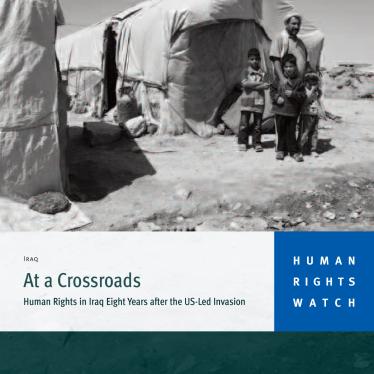(Beirut) - The rights of Iraq's most vulnerable citizens, especially women and detainees, are routinely violated with impunity, Human Rights Watch said in a report released today. Human Rights Watch conducted research in seven cities across Iraq during 2010 and found that, beyond the country's continuing violence and crimes, human rights abuses are commonplace.
The 102-page report, "At a Crossroads: Human Rights in Iraq Eight Years After the US-led Invasion," calls on the government to protect the rights of vulnerable groups and to amend its penal code and all other laws that discriminate against women and violate freedom of speech. The report also urges Baghdad to open independent and impartial investigations into all allegations of abuse against detainees, minorities, and journalists.
"Eight years after the US invasion, life in Iraq is actually getting worse for women and minorities, while journalists and detainees face significant rights violations," said Joe Stork, deputy Middle East director at Human Rights Watch. "Today, Iraq is at a crossroads - either it embraces due process and human rights or it risks reverting to a police state."
The 2003 invasion and its resulting chaos have exacted an enormous toll on Iraq's citizens. The deterioration of security has promoted a return to some traditional justice practices and religiously inflected political extremism, which have had a deleterious effect on women's rights, both inside and outside the home, Human Rights Watch found.
Militias promoting misogynist ideologies have targeted women and girls for assassination, and intimidated them to keep them from participating in public life. Increasingly, women and girls are victimized in their own homes for a variety of perceived transgressions against family or community honor. Trafficking in women and girls in and out of the country for sexual exploitation is widespread.
"The women and girls of Iraq have borne the biggest brunt of this conflict and resulting insecurity," Stork said. "For Iraqi women, who enjoyed some of the highest levels of rights protection and social participation in the region before 1991, this has been an enormously bitter pill to swallow."
Although improvements in security since 2008 have reduced the murder rate of media workers, journalism is a hazardous occupation in Iraq, Human Rights Watch said. Extremists and unidentified assailants kill journalists and bomb their offices. Increasingly, journalists find themselves harassed, intimidated, threatened, detained, and physically assaulted by security forces attached to government institutions or political parties. Senior politicians are quick to sue journalists and their publications for unflattering articles.
"Watching what's happened in the streets of Egypt and Tunisia, the Iraqi government should take meaningful steps to protect freedom of speech," said Stork.
Human Rights Watch also found that Iraqi interrogators routinely abuse detainees, regardless of sect, usually to coerce confessions. Despite knowing there was a clear risk of torture, US authorities transferred thousands of Iraqi detainees to Iraqi custodians, who have continued a tradition of torture that was also the case under Saddam Hussein and coalition forces.
While the government has passed laws to protect some of its marginalized communities, and in some cases has instituted significant assistance programs, it is still failing some of its most vulnerable citizens, Human Rights Watch said. Internally displaced persons, minorities, and persons with disabilities are among those at risk. Many of the government's assistance or protection programs are sub-operational or are insufficient to reach those who need it most.
More than 1.5 million Iraqis fled their neighborhoods as sectarian violence tore up their communities in 2006 and 2007. Thousands of internally displaced persons now live in squatter settlements without access to basic necessities such as clean water, electricity, and sanitation, Human Rights Watch said.
Armed groups proclaiming intolerant ideologies carry out assaults on minority communities, causing grave harm to Iraq's indigenous populations and forcing thousands to flee abroad with no plans to return. The government has failed to stop attacks targeting Sabian Mandaeans, Christians, and Yazidis, among other groups.
And the thousands of amputees wounded during years of armed conflict find themselves relegated to the margins of society, unable to find work, access adequate medical care, or even to obtain new prostheses and wheelchairs, Human Rights Watch found.
"Iraq's future as a democratic society based on respect for fundamental human rights will in large part depend on whether Iraqi authorities will adequately defend those rights," Stork said. "To do so, Iraqi authorities need to establish a credible criminal justice system meeting international standards with respect to torture, free expression, and violence against women and other vulnerable people in Iraq's society."







